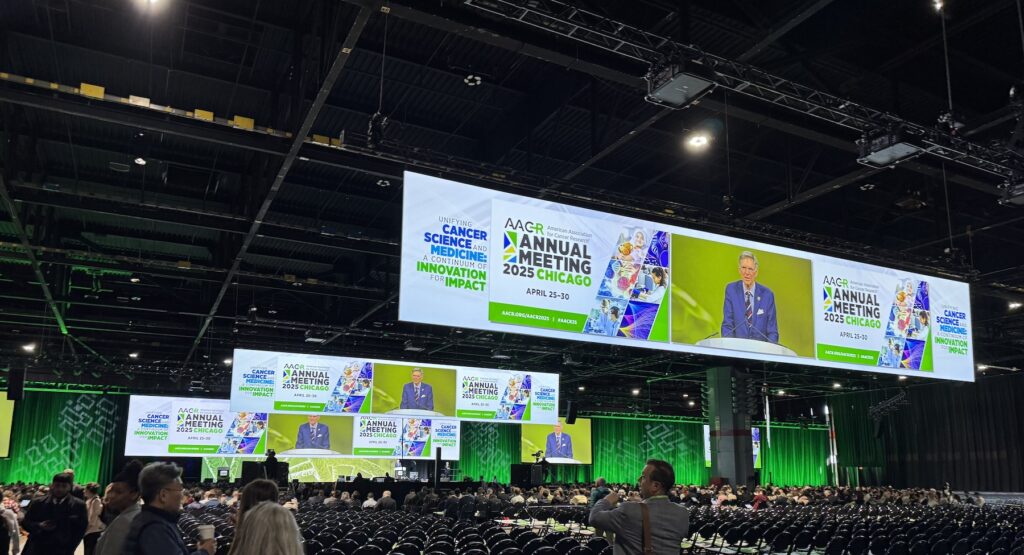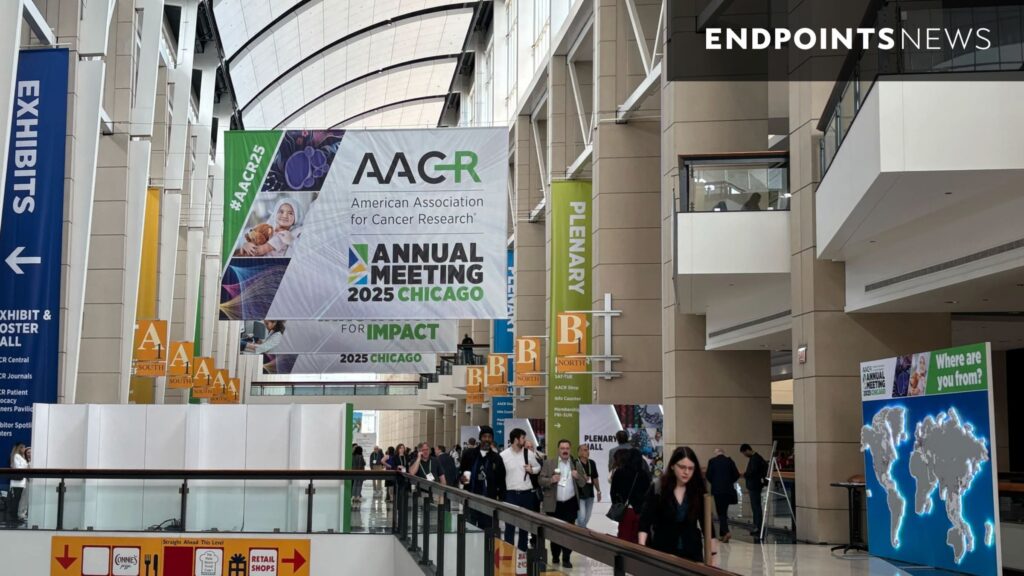AACR Annual Meeting 2025 (April 25–30, Chicago) brought together the global cancer research community under the theme “Unifying Cancer Science and Medicine: A Continuum of Innovation for Impact.” Key advancements across cancer types from AACR 2025 highlight progress in targeted therapies, immunotherapies, and innovative technologies, with several treatments entering late-stage development or regulatory review.

Lung Cancer
HER2-Mutant NSCLC:
Zongertinib, a novel HER2-targeted therapy, showed promising efficacy in patients with HER2-mutant non-small cell lung cancer (NSCLC), including those with rare HER2 mutations and those previously treated with HER2-targeted antibody-drug conjugates.
- Phase: 1a/b (Beamion LUNG-1 trial, NCT04886804)
- Target: HER2 mutations (TKD and non-TKD) in NSCLC
- Outcomes:
- Cohort 1 (TKD mutations, n=75): 71% objective response rate (ORR), 96% disease control rate (DCR), median progression-free survival (PFS) of 12.4 months, and median duration of response (DOR) of 14.1 months.
- Cohort 5 (post-HER2 ADC therapy, n=29): 48% ORR, 97% DCR, median PFS of 6.8 months.
- Next Steps: Priority FDA review granted; Phase II trial comparing zongertinib to standard therapies planned.
EGFR and ROS1 Inhibitors:
New generation of EGFR (aumolertinib) inhibitors demonstrated efficacy, including in patients with brain metastases and those previously treated with similar agents. Combination therapy with aumolertinib and chemotherapy improved progression-free survival.
- Phase: Retrospective analysis (79 patients with EGFR-mutated NSCLC and leptomeningeal metastases)
- Target: EGFR mutations (including L858R, exon 19 deletions)
- Outcomes: Median leptomeningeal PFS: 10.6 months; overall survival (OS): 17.7 months. Symptom improvement in 60/67 patients with LM-related neurological deficits.
- Safety: Tolerable profile; 77.2% experienced grade 1/2 adverse events (e.g., rash, creatine kinase elevation).
TIGIT Pathway:
The TIGIT-targeted antibody tiragolumab did not meet its primary endpoint in a large trial, indicating further research is needed to identify subgroups that may benefit from this approach.
Colorectal Cancer
Personalized Vaccine Therapy:
A personalized vaccine (NeoAg-VAX) targeting up to 10 patient-specific tumor proteins, with or without pembrolizumab, was safe and immunogenic in patients with microsatellite-stable metastatic colorectal cancer (MSS mCRC). Strong immune responses were observed, and the study provided insights into the tumor immune microenvironment.
- Phase: I (28 patients with microsatellite-stable metastatic colorectal cancer)
- Mechanism: Personalized vaccine targeting up to 10 tumor neoantigens ± PD-1 inhibition
- Outcomes: Median PFS: 9.8 months; OS: 17.7 months; Robust T-cell responses observed; 91.1% DCR in LM.
- Next Steps: Phase II trial to optimize combination strategies.
Breast Cancer
HER2-Targeted ADCs:
The antibody-drug conjugate fam-trastuzumab deruxtecan-nxki (T-Dxd; Enhertu) received expanded FDA approval for hormone receptor-positive breast cancers with low or ultralow HER2 expression, offering new options for patients with tumors resistant to traditional HER2 therapies.

Pancreatic Cancer
KRAS-Targeted Therapies:
Advances in small molecule inhibitors targeting KRAS mutations (including G12D and G12V variants, as well as pan-KRAS inhibitors) are showing promise for pancreatic and other cancers previously considered “undruggable”.
- Phase: I (KRAS G12D inhibitors)
- Outcomes: RMC-9805: 30% ORR, 80% DCR in pancreatic ductal adenocarcinoma (PDAC). ASP3082 (300 mg dose): 33.3% ORR in PDAC and NSCLC.
- Safety: Manageable side effects (e.g., fatigue, rash).
Engineered Exosomes:
Preclinical data indicated that engineered exosomes can deliver RNA to silence mutant KRAS in pancreatic cancer, representing a novel therapeutic approach.
- Phase: I (12 patients with metastatic pancreatic cancer)
- Mechanism: Exosomes deliver siRNA to silence mutant KRAS
- Outcomes: 6/12 patients achieved stable disease; no dose-limiting toxicities. Reduction in circulating KRAS G12D DNA observed.
- Next Steps: Phase II trial combining exosomes with immune checkpoint inhibitors.
Kidney Cancer
Radiotherapy Innovations:
The use of radiotherapy to avoid the toxicities of systemic treatments was highlighted as a promising approach for kidney cancer, potentially improving patient quality of life.
- Phase: II (121 patients with oligometastatic clear cell RCC)
- Outcomes: Median PFS: 18 months; systemic therapy-free survival: 34 months. 94% 2-year OS rate; ctDNA-based MRD assay validated as prognostic biomarker.
- Impact: Reduces reliance on toxic systemic therapies while maintaining efficacy.
Hematologic Malignancies (Blood Cancers)
CAR T-Cell Therapies: Advances in allogeneic (off-the-shelf) CAR T-cell therapies are making these treatments more accessible. New approaches use Boolean logic to ensure CAR T-cells only activate in the presence of specific combinations of leukemia markers, sparing healthy cells.
ADC for Lymphoma: Brentuximab vedotin (Adcetris), an antibody-drug conjugate, was approved in combination with lenalidomide and rituximab for relapsed/refractory large B-cell lymphoma, expanding treatment options for patients not eligible for stem cell transplant or CAR T-cell therapy.
BTK Inhibitor for Mantle Cell Lymphoma: Acalabrutinib (Calquence) received full approval as first-line therapy in combination regimens for mantle cell lymphoma, further broadening targeted therapy options.
General/Multiple Cancer Types
KRAS and Other Tumor Drivers: New therapies targeting KRAS (especially G12D), TROP2, and PSMA are being developed and tested across several cancer types, including colorectal, lung, and pancreatic cancers.
Liquid Biopsies and Organoid Models: Technological advances such as liquid biopsies for early detection and monitoring, and patient-derived organoid models for drug screening, are accelerating personalized treatment development and improving understanding of tumor biology.
Conclusion
AACR 2025 underscored transformative progress in precision oncology, with therapies like zongertinib (HER2) and NeoAg-VAX (personalized vaccines) advancing toward regulatory approval. KRAS-targeted agents and engineered exosomes represent breakthroughs for historically untreatable mutations, while metastasis-directed radiotherapy offers a toxicity-sparing paradigm. These findings set the stage for Phase III validations and novel combinations to improve outcomes across cancer types.
Source: AACR 2025


